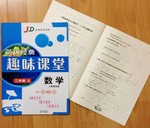题目内容
Many young ladies in the street have __________ their summer dresses in late spring.
A. put out B. brought out
C. stood out D. picked out
练习册系列答案
 黄冈经典趣味课堂系列答案
黄冈经典趣味课堂系列答案 启东小题作业本系列答案
启东小题作业本系列答案
相关题目
题目内容
Many young ladies in the street have __________ their summer dresses in late spring.
A. put out B. brought out
C. stood out D. picked out
 黄冈经典趣味课堂系列答案
黄冈经典趣味课堂系列答案 启东小题作业本系列答案
启东小题作业本系列答案